Read what our students have to say about their experiences of studying with us.
Language, Culture & History MA
- James Vaux (Scandinavian Studies)
- Why did you choose to study Scandinavian Studies at UCL?
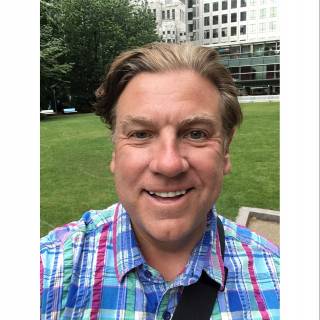
Having retired after a career in law and banking, and spending time living and working in Scandinavia, I wanted the learn more about the region’s culture and history in depth, which was sadly not an option when at work.
What are / were the highlights of the MA?
The interdisciplinary nature of the course is a standout feature, as is the ability to tailor research areas to my own interests. The course has enabled me to study and research modern, medieval and design history, literature, politics and cultural geography. Tuition standards have been first class and it’s so good to be taught by real experts in their fields. UCL is the home of the Viking Society for Northern Research, so you can’t find better place to study the Vikings! I’ve also developed a deep interest in Iceland, which I can’t wait to visit properly. Personal tutor and staff support during the Covid crisis has in my experience been excellent.
What skills do you think you’ve learned from your MA that will be / are useful for your career?
It’s good to have learned more of an academic style of writing / analysis and better research techniques. It’s useful, too, to have considered the application of more modern theories to humanities subjects: things have certainly moved on from the decades ago when I first graduated. The multi-disciplinary approach also enables you to consider the culture of countries in a well-rounded way.
What do you hope to do when you graduate?
Rather differently to other students (as I am retired) I aim to do some cruise lecturing in the Baltic region…if and when cruises ever happen again. Failing which I will enjoy Scandinavia even more when I can travel there and continue to learn about the Nordic region.
What advice would you give to prospective students considering Scandinavian Studies at UCL?
Get a good idea of what module choices are available in advance and try to speak to a few of your potential tutors. At MA level, even though language courses (other than Old Norse) can’t count towards your degree, you may well be able to join modern language courses by ‘auditing’ them. Finally, if you’re a later life learner like me, don’t be put off applying! There are quite a few of us oldies around in Language, Culture and History courses and it all works very well: it’s good to have a range of ages in classes.
- Ria Kakkad (Hispanic Studies)
- Why did you choose to study Hispanic Studies at UCL?
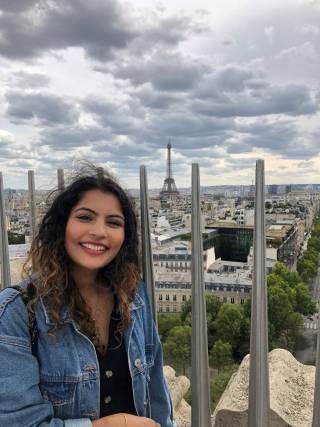
Whilst I was finishing my undergraduate studies, I constantly felt like I wasn’t ready to leave the world of education. After looking at different Master courses at other universities, I thought that the range of interdisciplinary modules at UCL was the right fit.What were the main highlights of the MA?
I really enjoyed the content and structure of my modules, even those outside of Hispanic Studies. I was still able to tailor my essays and research around my own areas of interest, all around literature. One of the main highlights was writing my dissertation, where my supervisor and LCH coursemates encouraged me to research different areas which I hadn’t really thought about before. The course ended in a completely different way than expected due to the lockdown. But, my personal tutor and other staff were so supportive during this time; it’s one thing I’m super grateful for.What skills do you think you’ve learned from your MA that are useful for your career?
I think my MA has developed my research, analysis, and critical thinking skills. My current role is as a Research Analyst at an ESG AI ethics rating firm — something completely different from my Hispanic Studies course! The transferable skills from the course are helpful in my current role, especially in presenting and discussing research.What advice would you give?
Don’t be afraid to take your research outside the box!
Comparative Literature MA
- Sophia Althammer
- The best thing about the MA Comparative Literature?
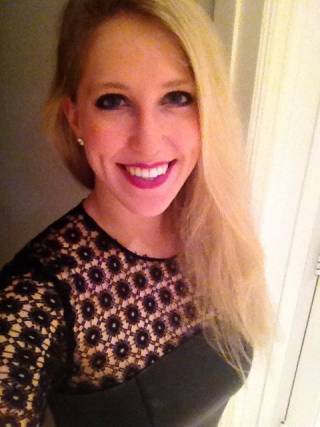
The small seminar groups enable you have in-depth discussions on the reading material or theories discussed in the individual weeks and are very thought-stimulating.
Where were you before coming to UCL?
I studied for combined BA in Publishing Media and English Literature at Oxford Brookes University
Why did you choose to study for an MA/MSc at UCL?
I was attracted to its location in London, as well as by the fact that UCL is internationally renowned. When I visited the campus during an Open Day I could picture myself studying here, and that made my decision very easy.
What does your Programme involve and what do you hope to learn from it?
Comparative Literature – as the name implies – is the study of literature from a comparative angle. It is however by no means limited to comparing literary texts from different languages, the field is highly interdisciplinary and looks at various arts, as well as history and politics in a comparative context to reach a new understanding of the world and dealings in it.
What have been the highlights of the Programme so far?
The small seminar groups enable you have in-depth discussions on the reading material or theories discussed in the individual weeks and are very thought-stimulating. It is always great to be introduced to new texts from around the world you would have not encountered otherwise and then be able to discuss them with people as interested in them as you are.
The other students on this course have also been great, and I have made some wonderful friends over the course of just a few months.
What skills do you think you will learn from your Programme that will be useful for your career?
Apart from broadening my literary knowledge, I am hoping to improve my critical and analytical skills, develop my research abilities and further develop team-working abilities on an international scale.
What do you hope to do when you have graduated from your Programme?
I strive to work in the international commercial publishing industry, either for a literary agency or a publishing house.
What advice would you give to prospective students in your Programme?
Be prepared to read a lot, and very widely! And do not hesitate to create study-, research- or peer-review groups and meetings with your fellow students, the feedback and ideas from those interactions can be as helpful as feedback from your professors.
Describe the atmosphere in your Programme at UCL in five words…
Welcoming, Interesting, International, Inspirational and Supportive.
- Jason Beckman
- The best thing about the MA Comparative Literature?
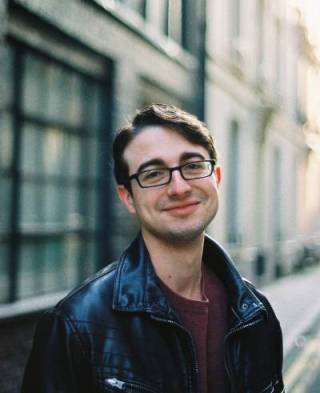
The collection of sharp, insightful people and thought-provoking topics of study have made for excellent class discussions and a wonderful experience, overall.
Where were you before coming to UCL?
I was working as a software developer for an industry supply company in the Chicagoland area.
Why did you choose to study for an MA/MSc at UCL?
I wanted to pursue a one-year master’s degree in the UK in literature, knew of UCL’s reputation and thought the research interests of the Comparative Literature Department / CMII faculty aligned very well with the topics I’m interested in and work I want to do.
What does your Programme involve and what do you hope to learn from it?
There’s extensive coursework and readings in literature and literary theory, which provide the bases for seminar discussions and for the assigned essays. The Programme has also provided the flexibility to complement the core course modules with modules from other departments (I personally took a Translation Studies course and a course on Modern Japanese Literature at SOAS), and I have thus been able to tailor the Comparative Literature learning experience to suit my interests and fields of study.
The Programme will culminate with a dissertation that will allow me to apply the theories I’ve been studying, as well as comparative approaches, to works in Japanese and American literatures.
What have been the highlights of the Programme so far?
The highlights for me have been the people and the course content. I’ve made a number of dear friends and worked with incredible, supportive faculty members. The collection of sharp, insightful people and thought-provoking topics of study have made for excellent class discussions and a wonderful experience, overall.
What skills do you think you will learn from your Programme that will be useful for your career?
I’m planning to pursue an academic career, and the reading/writing I am doing in my Programme serves as an important part of my preparation for that. I have done a considerable amount of research for course assignments that bridge my academic interests in Comparative/World literature and Japanese literature and have experimented with a range of topics and writing styles, developing my academic writing and learning about the kind of academic writer I hope to become.
What do you hope to do when you have graduated from your Programme?
I will be beginning a PhD in Japanese Literature at Stanford University in the Fall.
What advice would you give to prospective students in your Programme?
Take risks in your thinking and writing! Faculty members are very supportive of the work that you want to pursue and will give a lot of fantastic insight and support, if you seek them out.
Collegial, thought-provoking, diverse, supportive, fun
Do you have any other comments?
Just that I’m incredibly pleased with my decision to come study with the Comparative Literature department at UCL!
- Bixuan Zhong
- The best thing about the MA Comparative Literature?
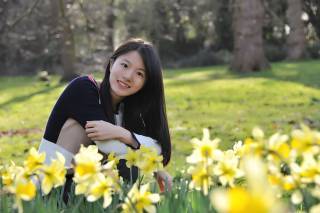
This programme really cultivates critical thinking.
Where were you before coming to UCL?
Shanghai International Studies University
Why did you choose to study for an MA/MSc at UCL?
UCL is famous for its high quality of academic research.
What does studying for an MA in Comparative Literature involve? And what you hope to learn from it?
The Comparative Literature programme involves taking four modules, and also enables students to select courses from other programmes. The two main courses are Literary Theory studies and Comparative Literature Studies. My main interest is to learn more about literary theories and about methods for analysing literary works.
What have been the highlights of the Programme so far?
This programme really cultivates students’ critical thinking.
What skills do you think you will learn from your Programme that will be useful for your career?
Since I want to be a teacher, I think all the knowledge I learn from classes will be useful for several aspects of my future career.
What do you hope to do when you have graduated from your Programme?
I would like to continue my studies and obtain a PhD.
What advice would you give to prospective students in your Programme?
Make full use of your time and recourses in UCL. You can also audit classes in other subjects if time permits.
Describe the atmosphere in your Programme at UCL in a few words…
Free, comfortable & pleasant
Early Modern Studies MA
- Fred Carneg
- Why did you choose to study Early Modern Studies at UCL?
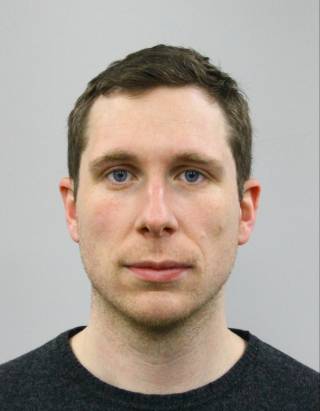
I chose the Early Modern Studies MA because I wanted to experience a broad range of different disciplines and approaches to studying the Early Modern period.
What are / were the highlights of the MA?
I took history, art history and political thought modules, alongside writing essays on cartography, printed images in Spain and Utopian thought. The ability to study a variety of different topics whilst still keeping focused on my core interests was really great.
What skills do you think you’ve learned from your MA that will be / are useful for your career?
The exposure to a number of disciplines and approaches definitely helped to improve my academic skill set but also helped me to to hone in on the areas that really interested me. I’m currently doing a history PhD at UCL and I think that the MA was able to improve my skills as a historian pretty substantially.
What do you hope to do when you graduate?
I’m lucky enough to be doing an LAHP funded PhD at UCL now, on a topic that came directly from my MA dissertation.
What advice would you give to prospective students considering Early Modern Studies at UCL?
Take advantage of the breadth of the modules choices available to you. The strength of the MA is really being able to take your pick from a wide variety of different departments and disciplines and to figure what works for you as a potential researcher into the Early Modern period.
- Harry Chancellor
- Why did you choose to study Early Modern Studies at UCL?
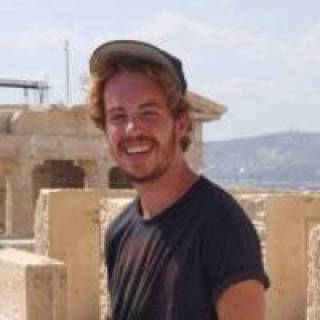
I chose to do the course, because I intend to do a PhD in literary history, and UCL is a fantastic university!
What are / were the highlights of the MA?
Enjoying my thesis so far; also, good selection of modules, ‘Early Modern Handwriting’, ‘Shakespeare in his Time’, ‘Public Sphere in Britain’, all well taught.
What skills do you think you’ve learned from your MA that will be / are useful for your career?
Developing my research and writing skills for a career in academia or teaching.
What do you hope to do when you graduate?
Next year I will be doing the first year of my PhD in the UCL English department. I hope to gain experience in tutoring alongside this.
What advice would you give to prospective students considering Early Modern Studies at UCL?
Advice would be to tailor the modules to your particular research interests. There are a good selection on offer, and lots of scope for doing work in a variety of departments with different methodological focuses. Make the course as varied and lively as possible!
- Lisa Nicholson
- Why did you choose to study Early Modern Studies at UCL?
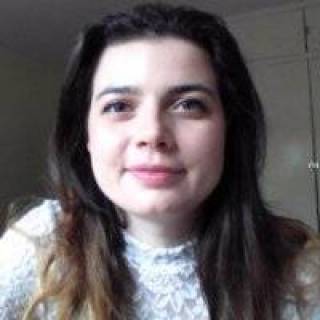
Having studied French and Russian BA as an undergraduate at UCL, I decided to continue there for my MA on the Early Modern Studies programme as the standard of teaching had been excellent. The academic support received during my undergrad had nurtured my interest in early modern women and seventeenth-century France, making me confident that UCL was the best place to pursue my studies. Its proximity to the British Library, the Wellcome Collection and Dr William’s Library was also an important factor given their wealth of archival material essential to my research interests.
What are / were the highlights of the MA?
I thoroughly enjoyed the palaeography module, which introduced me to an excitingly practical side of early modern studies. Learning palaeography was like learning a new language, and it was satisfying to see my progress each week as we were given trickier and messier hands. We also learned to cut a quill from swan’s feathers, and our attempts to write with our home-made quills further endeared the subject of palaeography to me knowing how laborious each letter was to write.
What do you hope to do when you graduate?
I’m currently tutoring and working as an Archive Volunteer at the Heinz Archive (National Portrait Gallery) whilst I prepare my PhD application for the next academic year.
- Masuda Qureshi
- Why did you choose to study Early Modern Studies at UCL?
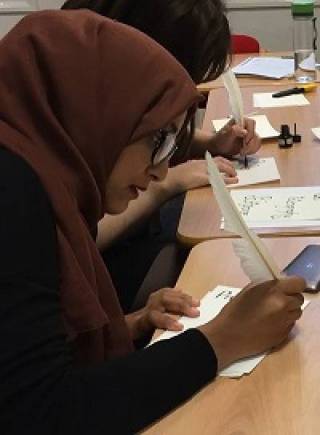
After choosing predominantly modules on the Early Modern period during my undergraduate studies I decided that there was a lot more to learn.
What are / were the highlights of the MA?
As this MA is interdisciplinary I was able to choose from 40 modules across different departments at UCL; this was particularly useful as my interest lies in Early Modern science. We also had trips to places like the Royal Society, St Brides Library (where they have an actual printing press from the seventeenth century), and the National Archives.
What skills do you think you’ve learned from your MA that will be / are useful for your career?
I loved learning palaeography; it helps when I look for original research material in manuscripts. I started off very flaky but managed to learn quite a lot in a short space of time.
What do you hope to do when you graduate?
I am planning on doing a PhD in Early Modern literature and its relation to science. The work for the MA, especially the annotated bibliography, helped me shape my research proposal and also secure two PhD places. I cannot express how invaluable this experience was.
What advice would you give to prospective students considering Early Modern Studies at UCL?
Do not worry if you don’t know what you will work on just yet. The MA will shape the way you think about the period and there is always something new and exciting to work on.
European Studies
- Ahmet Furkan Gungoren (Modern European Studies MA)
- I know why UCL is scoring very high in university rankings. Its professors, the system of education but also the facilities that are provided by the university are amazing!
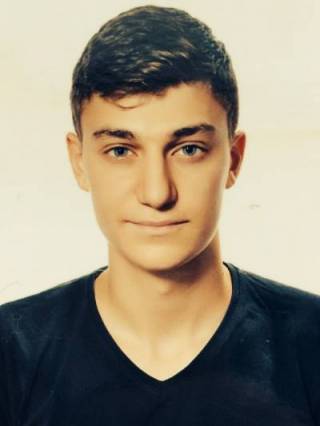
Where were you before coming to UCL?
Studying Internation Studies at Leiden University in the Netherlands
Why did you choose to study for an MA/MSc at UCL?
I can say that the fact that UCL is one of the most prominent universities not only in the UK but also in the world was the most significant reason to apply for an MA at University College London. Being able to study in a metropolis as London was for me a desire as it contributes a lot to a student life, to exemplify: meeting beautiful people from all over the world, getting used to live in a multifaceted city with a huge variety of opportunities and degusting the profits designed for a perfect student life.
What does the MA in European Studies involve? And what do you hope to learn from it?
The programme European Studies, subjects an MA student to core courses related to Europe and the European Union that form an indispensable part of this dignified Masters study. It also provides the freedom in terms of choosing from a wide range of courses listed in various other humanities and social sciences studies. For me, the uniqueness of the programme results from its interdisciplinary approach to European studies, the study does not only shed light on European politics, but also sociology, history and economics. Due to this, a student is provided a broad and profound perspective to the studied questions and issues.
What have been the highlights of the Programme so far?
Going to the Imperial War Museum for the history class: “The Making of Modern Europe” was an excellent experience, it was a possibility to see the matters on site.
What skills do you think you will learn from your Programme that will be useful for your career?
The main skills I have learned are making independently in-depth research on multiple past and contemporary subjects. Besides, my writing but also oratory skills have amazingly improved, which are of great significance when presenting the research made.
What do you hope to do when you have graduated from your Programme?
I would like to work at one of the following institutions: a news channel, an NGO or a think tank. Afterwards, I hope to find a PHD vacancy and become an academic in the future.
What advice would you give to prospective students in your Programme?
In order to live your student life to the fullest, make sure you spare time to enjoy London with the new friends you will make at one of the best universities in the world.
Describe the atmosphere in your Programme at UCL in five words…
Vivid, Motivating, Harborous, Unique, Full of spirit
Do you have any other comments?
I can easily convey that after having studied for two terms now, I have noticed why UCL is scoring very high in university rankings. Its professors, the system of education but also the facilities that are provided by the university are amazing!
- Shiying Liu (Modern European Studies MA)
- The teachers are all great scholars — imagine browsing in a bookstore and immediately you saw your tutor’s name on one of the books! That experience was brilliant and I felt very proud!

- Thomas Crew (European Culture and Thought MA)
Where were you before coming to UCL?
Royal Holloway, University of London
Why did you choose to study for an MA/MSc at UCL?
I found the European Culture and Thought course particularly interesting because it allowed me to continue studying German, whilst branching out into European philosophy. But there are many other ways the course can be shaped. Also, my preference was to stay in London, and UCL has some good finding opportunities.
What does your Programme involve and what do you hope to learn from it?
The basis of the course are the two core modules plus the dissertation, which is completed over the summer. The first of these courses is on social theory, in which we covered thinkers including Rousseau, Freud, Marx, Hannah Arendt and Michel Foucault. Aside from the module on essay writing and discussion in German, I also took a course on German literature and its ties to the origins of psychology.
What have been the highlights of the Programme so far?
Quite possibly Rousseau’s Social Contract and Discourse on Inequality. They should probably be compulsory reading in all secondary schools, so that we might remember that society is a two-way process that is only legitimate when it is based on an active and consenting population.
What skills do you think you will learn from your Programme that will be useful for your career?
More than for my career, I hope that the ideas I learn from will be helpful for my life.
What do you hope to do when you have graduated from your Programme?
I hope to return to Germany where, initially at least, I’ll teach English in a German school.
What advice would you give to prospective students in your Programme?
To make a better effort than I do to remember that studying is an end in itself. As Nietzsche says: “That day is lost to us on which we didn’t even dance! And that truth is false to us, which wasn’t accompanied by laughter!”
Film Studies MA
- Meiqian Qian
- This programme is all about studying different genres and directors as well as making links to different periods in each country's film history.
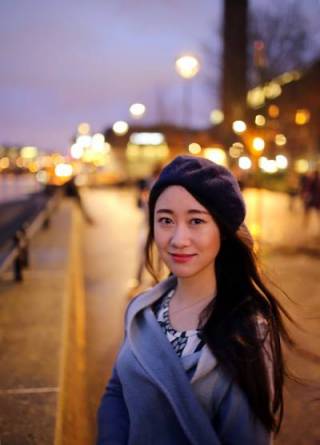
Where were you before coming to UCL?
China.
Why did you choose to study for an MA/MSc at UCL?
UCL is a TOP 5 university in the UK and has a high reputation and also provides an awesome environment for studying. On top of that UCL has a great diversity of courses.
What does your Programme involve and what do you hope to learn from it?
My courses are: Reading and Researching films, Film Exhibition, Italian\Spanish film and Practical Documentary Filmmaking. This includes both the core course, optional modules and modules I am auditing. My aim is to gain a thorough understanding of international film history including different genres, waves and transitions. In addition, I have the opportunity to delve deeper into some of my favourite aspects, such as Spanish and Italian films. Besides learning about theory, the module on practical documentary film making gave us a great opportunity to learn about filmmaking behind the scenes. In brief, the programme is really diverse.
What have been the highlights of the Programme so far?
In my opinion, it is all about studying different genres and different directors as well as making links to different periods in each country's film history.
What skills do you think you will learn from your Programme that will be useful for your career?
Filmmaking, critical and creative thinking, doing a lot of research. Also being hard working, paying attention to details and to be able to meet the deadlines.
What do you hope to do when you have graduated from your Programme?
I want to find work in the film or television industry focusing on documentary filmmaking or doing the curatorial work in film exhibitions or exhibitions about important subjects in today’s world such as gender (in)equality or human rights.
What advice would you give to prospective students in your Programme?
Make good use of the library, it is a real goldmine and you will love it!!!
Describe the atmosphere in your Programme at UCL in a few words…
Creative, quiet, friendly, relaxed.
Do you have any other comments?
The staffs in CMII and our course tutors are all very nice and helpful.
- Edward Elliott
- I’ve gained a really strong, analytical approach to film and film theory.
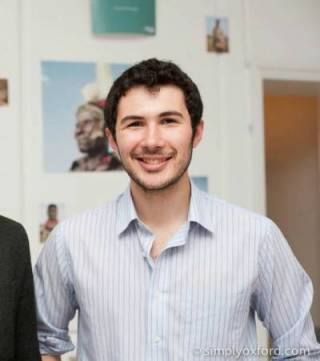
Where were you before coming to UCL?
Oxford University.
Why did you choose to study for an MA/MSc at UCL?
I wanted to study Film Exhibition and Film Theory. Very few courses offered both. Plus I had to choose somewhere within easy travel distance of Cambridge for living purposes.
What does your Programme involve and what do you hope to learn from it?
An introduction to film studies and film history in the Core modules, followed by a series of optional modules on regional cinema and theoretical approaches. I’ve already feel like I’ve gained a really strong, analytical approach to film and film theory. I hope to continue to grow further in the final term and really explore some topics in depth.
What have been the highlights of the Programme so far?
Lots of stuff. I really enjoyed the core course, exhibition and theory modules. The reading for Theory has been really special and I have probably learnt the most from. But getting to explore film history was something that I’ve wanted to do for a long time as well.
What skills do you think you will learn from your Programme that will be useful for your career?
Well kinda depends on my future career – which I’m unsure of at the mo. I might go into academia. So probably a lot of skills …
What do you hope to do when you have graduated from your Programme?
Depending on my results, apply for a PhD.
What advice would you give to prospective students in your Programme?
Keep on track of written work, start early and give yourself as much time to work on it as possible. And do all the reading that is set (although this should be a given).
Gender, Society and Representation MA
- Kaniska Singhal
- The MA program is a very interesting amalgamation of subjects from multiple disciplines. The core classes focus on very many issues ranging from gender in the political arena, to representations in various forms of literature and films, to different gender theories.
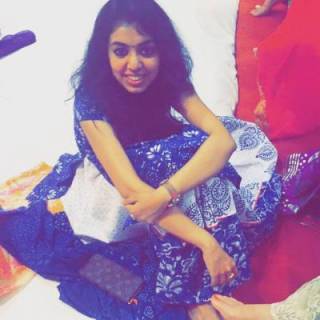
- Shreya Agrawal
- This Masters programme has a diverse set of students which has enhanced discussions on various topics inside and outside the classroom.
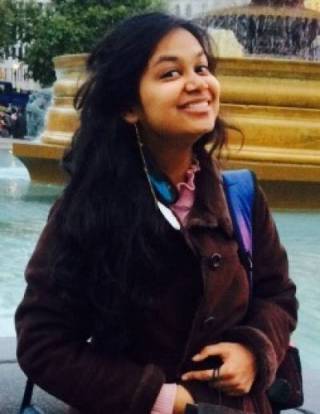
- Ranjita Diljaj
- My favourite module has been the one on Intersectional perspectives with its focus on feminism in the postcolonial world and black feminism. The multidisciplinary nature of the course was refreshing and provided an insight on the topics from different angles.
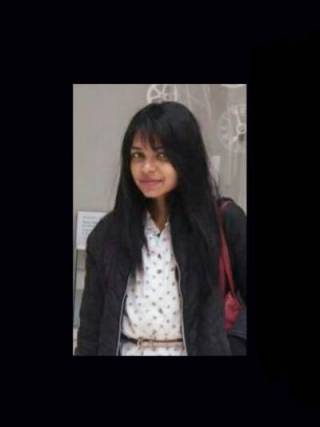
Health Humanities MA
- Coming soon
Coming soon
Philosophy, Politics and Economics of Health MA
- Shervin Poladi
My undergraduate degree was in Neuroscience and I decided to study the masters in PPE of Health at UCL as I thought it would give me the unique opportunity to examine issues concerning health from a variety of perspectives. Indeed, in one of my course choices Philosophy and Ethics of Translational Clinical Science, I have been able to complement my current scientific knowledge with an understanding of the ethical dilemmas and political pressures that can occur throughout clinical trials. Members of staff are truly enthusiastic about their subjects and it is reflected in the lectures, and as the course attracts students from a great diversity of backgrounds the seminars are always engaging. In another of my course selections, General Philosophy, it gives one the chance to delve into famous philosophical questions and to appreciate some of the fundamentals of philosophy. So far, I am thoroughly enjoying the experience.
- Tulasi Chadalava
Being a student on the MA has provided me with the opportunity to take a step back from clinical medicine, and I have found that learning with others from different backgrounds has enabled me to move away from a medical mind set and appreciate the wider world that surrounds health.
- Dr Dan Bernstein
The course is thankfully beginning to illuminate some of the thinking behind the health policy which shapes my work. It's also great to have some pure intellectual stimulation, thinking about academic and practical implications of measuring health, and of advancing health research.
Race, Ethnicity and Postcolonial Studies MA
- Coming soon
Coming soon
Translation Studies MA
- Isabel Caddy (Translation and Culture)
- Why did you choose to study Translation at UCL?
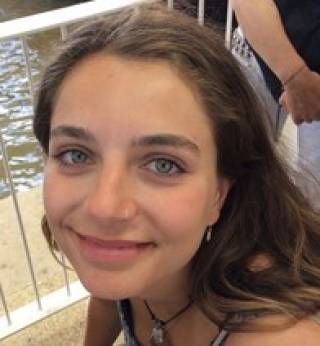
I did a BA in Spanish and French at UCL and in my fourth year I did an Audiovisual Translation module with a teacher from UCL Centre for Translation Studies, which was my first insight into this kind of translation. Following this module, my interest in translation grew and I started to consider the possibility that it might be something I wanted to do professionally. While UCL was an obvious choice for me – I already knew the campus, teachers and city – after exploring other options, I realised there are also so many other benefits of studying there. Most significantly, perhaps, the calibre of teachers really drew me to the UCL course. Many of the professors are the top of their field, not to mention they have a wealth of experience that enables them to give you a real insight into the industry.What were the highlights of the MA/MSc?
For me, the highlights of the MA include the flexibility of the course structure. I was able to pick very varied modules that helped me understand which areas of Translation Studies were most appealing to me. While I took some AVT modules, as I already knew I wanted to improve my skills in this area, I also took modules such as, Crisis Translation and Spanish Translation that included all different genres of text. Furthermore, the fact much of the course is focused on the “real” world of translation, rather than academic theory (though this is covered, with the option to choose modules to go further), meant that by the end of the course I felt incredibly well prepared to embark on a career as a professional translator.What skills do you think you’ve learned from your MA/MSc that are, or will be, useful for your career?
The most beneficial skills I learnt from my MA were using both CAT tools and AVT software, which has stood me in good stead when picking up freelance translation work. Also, the Professional Skills for Translators module gave me an insight to what it is like to work in a translation agency and taught me many skills including creating invoices, calculating rates, etc. This module taught me what to expect in the industry and gave me the chance to experience what is like to be the project manager in a translation project.What are you currently doing after graduation, or what do you hope to be doing when you graduate?
I have moved to Spain to focus on my language skills and while I’m here I am picking up bits of freelance translation work, mainly involving subtitling. I’m hoping to get some work experience in a translation agency too. I have also just finished a research project focusing on post-editing subtitles I was doing through UCL with the University of Córdoba, Spain.What advice would you give to prospective students considering Translation at UCL?
If you enjoy translation and you think it might be a potential career path for you, I would say, go for it! It’s an interesting and flexible course and you can tailor it to suit your specific interests. One of the biggest advantages is the connections you’ll be able to make though your professors and fellow students. I received a lot of support over the year, which hasn’t stopped upon finishing the course. My professors are still always available to give me advice when I need it and they even recommend me for jobs, which has been a great way to make more connections as I embark on a career in the industry. It is an eye-opening course that will teach you so much about translation and will help you to decide which areas you are most passionate about. - Enrica Aurora Cominetti (MA Translation)
- Why did you choose to study Translation at UCL?
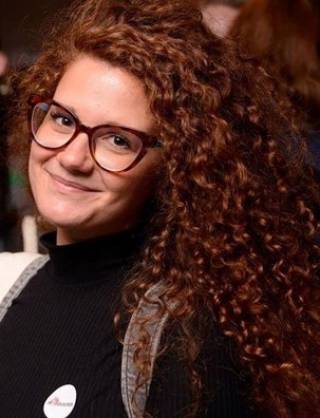
After attending courses in Translation as a SELCS affiliate at UCL during my Erasmus programme in 2013-2014, I knew I wanted to study Translation there again. I chose to pursue the MA in Translation Theory and Practice because, besides being renowned for its high-quality teaching and research, it perfectly combined the study of theoretical issues with the acquisition of professional skills. Moreover, its flexible programme would have allowed me to blend my interest in language translation with my passion for other academic disciplines, such as gender studies.What were the highlights of the MA/MSc?
I have so many good memories of my MATTP. Its international student cohort gave me the chance to become friends with many inspiring people from all over the world, and to learn about and from their cultures. My view on intercultural issues was further broadened by the modules I took from both my department and other programmes, like the course on Gender, Society and Representation. I also had the pleasure to be mentored by wonderful professors, such as Dr Geraldine Brodie and Dr Cristina Massaccesi, who supported me not only during my studies at UCL, but also in achieving my post-MA projects.
I thoroughly enjoyed my MA and was so passionate about the subjects I studied that, after completing my degree, I was placed on the 2016 Dean’s List for academic excellence. I still consider my UCL adventure as one of the most thought-provoking and rewarding experiences I have had so far.What skills do you think you’ve learned from your MA/MSc that are, or will be, useful for your career?
The extremely diverse MATTP programme – which was delivered through lectures and seminars, and blended together different types of assessments, such as individual and group research projects – equipped me with a broad range of soft and hard skills. The conversations I had and the group work I did inside and outside of the classroom really helped me refine my communication, critical thinking and teamwork abilities. Moreover, the extensive coursework and readings in translation, gender and cultural studies theory allowed me to expand my academic interests, enhance my research and translation skills, improve my academic writing and attain a comprehensive and multidisciplinary knowledge. These are all tools that turned out to be essential in pursuing my career, as they provided me with the foundation for the work I am currently doing, which crosses different languages and academic disciplines.What are you currently doing after graduation, or what do you hope to be doing when you graduate?
I am now a Lecturer in Italian Studies at the University of Guelph (ON, Canada) where I teach beginner and intermediate Italian to around 150 students per semester. As part of my academic work, I also carry out translations from French and Italian into English and vice versa, and conduct research on second language learning and teaching, the application of digital humanities to cultural and literary studies, and the cross-fertilisation between French auto/biography and gender studies.What advice would you give to prospective students considering Translation at UCL?
Don’t be afraid of stepping out of your comfort zone – try and seize all the wonderful opportunities that UCL and its surroundings have to offer in terms of academic and personal growth. Make sure to check out not only the resources available at the Main Library and at the Senate House Library, but also those provided by the UCL Careers department. And do attend the Translation Lecture Series, as they present interesting insights into the development of the theory and practice of translation. I really enjoyed volunteering for one of those lectures, so I highly recommend them! - Sui He (MA Translation)
YouTube Widget Placeholderhttps://youtu.be/LZCBHprYWKs
Translation and Technology MSc
- Rob Bell (Scientific, Technical and Medical)
- Why did you choose to study Translation at UCL?
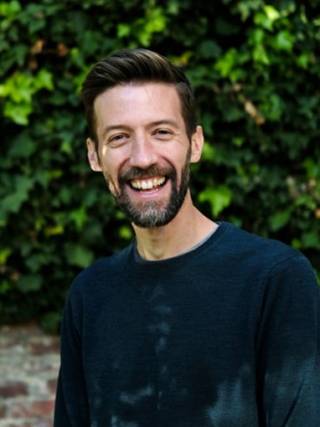
I already lived in London when I decided to do a masters in translation and, as a mature student, I wasn’t planning to relocate to study, so not only was UCL in the right location for me but it’s also a world-class university with a great reputation, which definitely influenced my choice. However, it was the content of the course that appealed to me the most: its technical focus, the range of modules, and the overall practical emphasis.What were the highlights of the MA/MSc?
I enjoyed many different aspects of my MSc course, from the practical translation sessions conducted in small study groups, to the wide range of subjects covered in lectures, such as translation theory and machine translation.
However, the highlight of the course for me was the module on subtitling, an area I was previously unfamiliar with. I quickly fell in love with the art of subtitling, and I am continually drawing on the skills and approaches I learnt at UCL in my work today.
Another aspect of my experience that made my time at UCL so enjoyable was being part of the academic community at CenTraS and, in my fellow students, meeting a great bunch of people from all over the world, many of whom remain good friends.What skills do you think you’ve learned from your MA/MSc that are, or will be, useful for your career?
There were three main areas that have been directly useful to me in my career as a translator. The practical translation sessions taught me how to approach a translation project, and gaining an understanding of translation theory gave me a solid basis for making decisions about tricky translations. The MSc also provided me with training in the use of a range of software, from CAT tools to subtitling software, allowing me to hit the ground running with work after I graduated. Finally, the course equipped me with a range of business skills, such as project management and invoicing, and a useful insight into the workings of the translation industry.What are you currently doing after graduation, or what do you hope to be doing when you graduate?
After graduating, I worked as a translation coordinator at a TV distributor, building on both my previous work experience and the new skills and knowledge I had acquired on the masters course. I then worked as a project manager in a translation company, before becoming a freelancer, primarily handling subtitling and translation work for film and TV. The translation industry can be challenging, but the MSc provided me with a great foundation on which to build my career.What advice would you give to prospective students considering Translation at UCL?
I would highly recommend studying translation at UCL; the course content, the teaching and the facilities are excellent, and the campus location in the heart of Bloomsbury is the icing on the cake of a great experience. The masters allows you to explore different aspects of the field of translation, and the dissertation provides a great opportunity for in-depth study of a specific area. - Harri King-Salter (Scientific, Technical and Medical)
- Why did you choose to study Translation at UCL?
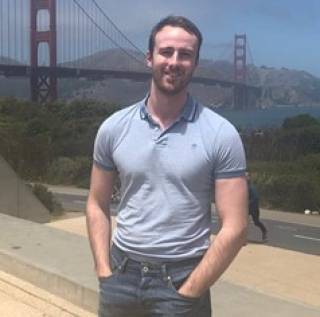
Having worked a few years as an in-house translator after my BA, I developed a passion for technical translation and wanted to seek further qualifications in that area. A regular MA in translation studies didn’t seem focussed enough for my purposes, so I was looking specifically for Specialised Translation courses that avoided legal/financial translation and focussed purely on technical/scientific. The MSc at UCL was one of the only programmes in the UK that met those requirements, so I signed up!What were the highlights of the MA/MSc?
It was very practice-focussed, which is exactly what I was looking for.What skills do you think you’ve learned from your MA/MSc that are, or will be, useful for your career?
The translation technology aspects were invaluable for an in-depth knowledge of translation tools and machine translation, technologies which I now use every day as a freelance translator. Meanwhile, the medical/technical translation seminars were exactly what I was looking for in terms of improving practical translation ability in challenging subject areas. The MSc definitely gave me an edge in both regards.What are you currently doing after graduation, or what do you hope to be doing when you graduate?
Immediately after graduating I became a full-time freelance translator and remain so to this day.What advice would you give to prospective students considering Translation at UCL?
If you are looking to become a professional translator in medical, technical or scientific fields, then there isn’t much that looks better on your CV than the MSc in Specialised Translation from UCL. In my case it was a key step on the road to a fulfilling and successful freelance translation career and I couldn’t recommend it highly enough. - Laura Barberis (Audiovisual)
- Why did you choose to study Translation at UCL?
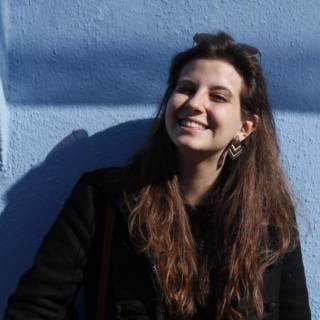
I realised that I wanted to pursue a career in Audiovisual Translation (AVT) when I was studying for my bachelor’s degree and, after I completed it, I started looking for a master’s on the subject. UCL CenTraS’ MSc in Audiovisual Translation was exactly what I was looking for: a course with a focus on the technical and professional aspects of AVT, offering a balance between essential core modules on Translation and AVT, such as Subtitling and Language and Translation, and fascinating optional modules, such as Localisation.What were the highlights of the MA/MSc?
The highlights of my MSc were definitely the insights from our lecturers on the professional world of translation and AVT. Many lecturers were also professionals in the field they taught and were able to provide useful information and advice on their professional environment. The focus of the MSc was to prepare us for the job market and, in my opinion, the result was successful.What skills do you think you’ve learned from your MA/MSc that are, or will be, useful for your career?
I learned a great deal of technical skills that I use on a daily basis, such as subtitling and localisation skills. In addition, I also learned how to present myself as a professional in the freelance world and several soft skills such as time management and teamwork, both very useful while participating in any translation project.What are you currently doing after graduation, or what do you hope to be doing when you graduate?
I am currently working as a freelance subtitler for an AVT company and as an Italian Localisation Quality Assurance Tester in the field of videogame localisation.What advice would you give to prospective students considering Translation at UCL?
My advice would be to not be afraid to ask questions. The experience and knowledge of the lecturers is not easy to find, and they are always happy to answer any doubt or curiosity you might have. I would definitely recommend the MSc in Audiovisual Translation to anyone and who wants to make it a profession, but also to anyone who is interested in the field and wants to expand their horizon on a different way of translating. - Hao Chen (Interpreting)
- Why did you choose to study Translation at UCL?
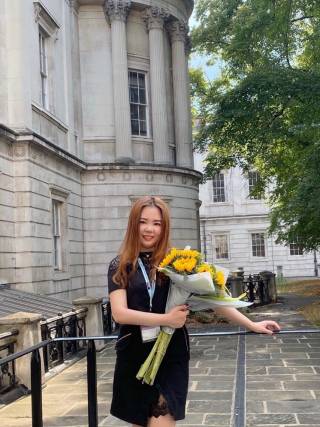
I think highly of the academic and teaching staff at UCL. When I wrote an essay and read articles and chapters in books related to translation studies (especially audiovisual translation) during my previous postgraduate study, I found that many of them were written by some academics from CenTras (UCL Centre for Translation Studies). That’s the first time I was thinking of the possibility to get a second master’s degree at UCL. Then I moved to London and talked to a friend of mine who was a CenTraS student at that time. She recommended the MSc programme that she was taking, explained the pathways and modules and answered my questions about the academic and career perspectives.
UCL is located in London, where I always wanted to come and further my study. I would imagine that life and study in central London are amazing, with many opportunities to visit museums, attend seminars, find an internship, among many other things.What were the highlights of the MA/MSc?
I think the flexibility in choosing modules is the first thing worth highlighting. The programme I took is MSc Specialised Translation with Interpreting, but there are many modules from other pathways that I could choose. For instance, I chose Subtitling in Term 1 and Topics in Audiovisual Translation in Term 2. Those two optional modules helped me a lot in the last term as my MSc dissertation was about subtitling.
I do like that our programmes involve both theoretical lectures and seminars as well as practical, hands-on exercises. Many of the modules provided had lectures and/or seminars that involve students from various language backgrounds. Once the theory and general guidelines in that specific domain had been covered, we were divided into groups to do translation practice, usually according to our language pairs.What skills do you think you’ve learned from your MA/MSc that are, or will be, useful for your career?
The two invaluable skills I have gained are translation and collaboration skills. I have learned translation theory, which helped me to write essays and the MSc dissertation, but I now also have translation experience that will have a positive impact on my career. For instance, Scientific and Technical Translation is one of the core modules for MSc students, and I found an internship as a translator in an IT company because I had this academic background.
I have also gained collaboration skills during the first and second terms and after last summer. In some modules, we could learn how to participate in a translation/localisation project as a translator, or even as a project manager. I also worked as a student collaborator in a UCL ChangeMakers project and learned from our project manager and other student collaborators, both in post-editing subtitles and collaborating with others.What are you currently doing after graduation, or what do you hope to be doing when you graduate?
I want to work in the language service industry (for around one to three years) and then apply for a PhD in Translation Studies.What advice would you give to prospective students considering Translation at UCL?
What makes CenTraS’ programmes unique is the combination of technology with translation studies. We learned how to use CAT (Computer-Assisted Translation) tools in one of the core modules and then continued using the software in then classroom and in our personal laptops (as we moved online because of the pandemic) for the rest of the year. I know some modules also provide licences of other software and cloud-based platforms (e.g. subtitling). Therefore, if you are interested in translation studies and want to explore more about the possibility of combining translation and technology, do not hesitate to contact the CenTraS’ kind and friendly staff.
 Close
Close

